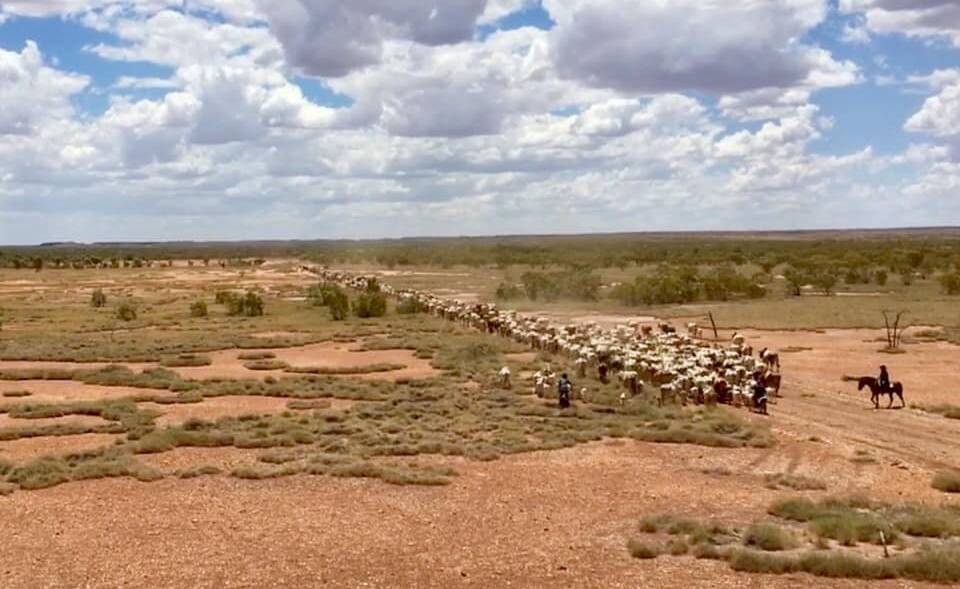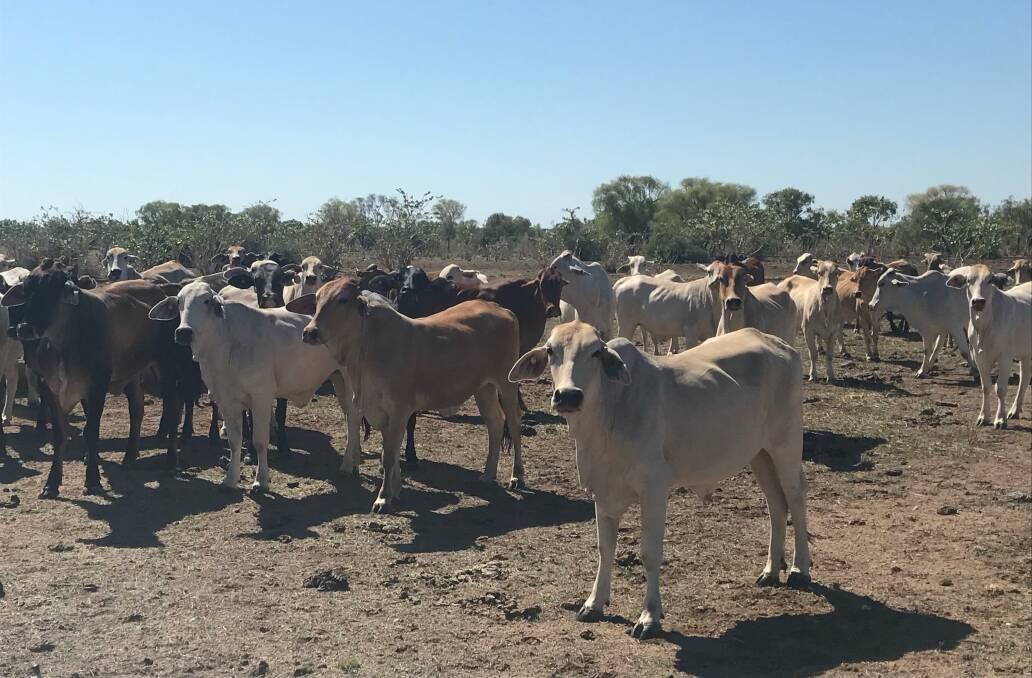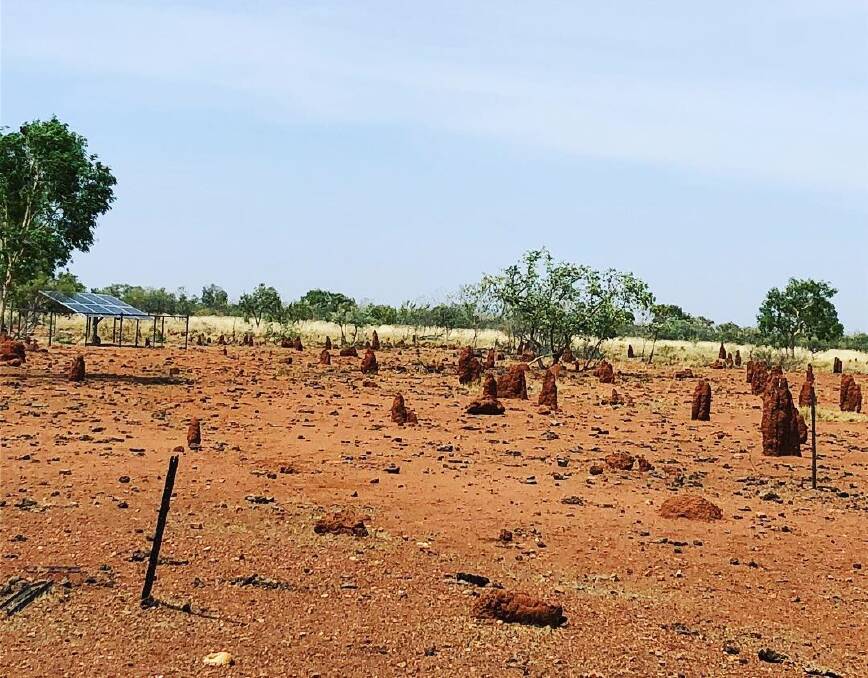
The wet season has so far failed to fire across the Northern Territory and beef producers are now looking to other states that are less pasture depleted to offload cattle.
Livestock agents in western Queensland are warning large numbers of NT cattle will be coming onto the market within the next month - and many more if rain fails to arrive during March.
In the clearest signal yet that conditions are getting dire on the Barkly Tablelands, the Australian Agricultural Company (AACo) will offloaded 6000 single brand Number 8 steers from Brunette Downs, NT, at the Western Queensland Livestock Exchange (WQLX) in Longreach on Friday March 22.
The following week, on March 29, Australian Green Properties from Alice Springs will offer 2000 Droughtmaster cross steers (250 to 350kg) and 500 Droughtmaster cross heifers at WQLX. AACo will also offer another 2000 composite steers and heifers from Brunette Downs at that sale, through Landmark.
The 6000 steers selling on March 22 are being sold through Elders with half the steers marketed as being 200 to 300kg with the other half 300 to 360kg.
AACo management had hoped for a strong wet season to take the composite steers through to feeder weights before offloading them onto the domestic feeder market. The steers would have previously been destined for AACo's 1824 branded beef market.
Elders Queensland livestock sales manager Paul Holm said the sale represented an opportunity for producers in north west Queensland to purchase runs of well bred cattle close to home.
"AACo are bringing the cattle to where the grass is and there are certainly some people whose interest has been piqued. They are hoping they'll have a significant body of feed by the time the sale comes," he said.
"It is a great thing for Longreach too - it will be the first sale in what would be about four years at the WQLX."
TopX Cloncurry livestock agent, Phil Avery, was busy sorting through cattle on the Barkly Tableland last week.
Mr Avery said producers were looking to offload light store steers and heifers first with the hope of maintaining their core breeding herd. Any cows that can be culled will also be coming onto the market, he said.
"They aren't panicking but they are planning to shift a lot of cattle in the near future," he said.

"I am marketing a lot of them privately - using the TopX network to sell out of the paddock," he said.
He said stock were selling into areas that had received beneficial rain including Cloncurry, McKinlay, Prairie and Charters Towers.
Mr Avery said most of these cattle would have normally been taken through to feeder weights and either sold onto live export boats or into the domestic feed-on market.
"We are receiving a good rate for them but it is a buyers market," he said.
NTCA responds
Northern Territory Cattlemen's Association CEO Ashley Manicaros said the NTCA had been investigating what needed to be done across the drought stricken NT from a "proactive animal welfare" point of view.
He said most of the NT had received less than half of their average wet season rainfall, with some areas having received little to no rain.
Mr Manicaros said NT Department of Primary Industry stock inspectors had been on the ground and he'd also spoken to Federal Agriculture Minister David Littleproud about the looming issue of having to move large numbers of stock.
"The challenge is where to move stock to," he said.
"We don't know what our options are yet. What we do know is that there will need to be some sort of coordinated response. I hope to know more soon - maybe even later this week."
Tennant Creek
Katherine and Sandy Warby, Phillip Creek, 50km north of Tennant Creek, have received just 40mm of rain so far this wet season - a period they would normal expect to record about 370mm.
They have already offloaded stock early, selling 30 decks of steers into the Indonesian live export market out of Darwin in February.
Mr Warby said those cattle would have normally be sold in the middle of the year, with more far more weight on them.
"If it doesn't rain we'll go through our backgrounders and pull the tops out for the boat market and anything lighter we'd be looking to sell back into Queensland," he said.
"We are a little bit concerned (about the number of stock due to hit the market) but we just have to try and keep our core breeders alive."

The Warby's have been on Phillip Creek for 13 years and say 2008 was as similar season but not as severe.
"The difference then was that we still had water in our dams but his year has been such a hot summer and we only got half our rainfall last year - it's just sucked a lot of water out pretty fast," he said.
"We are destocking some paddocks that are on dams and shifting cattle out to the west where we have run some new infrastructure in the past couple of years.
"The northern end of our property is fairly underdeveloped so we are sinking some new bores and just trying to develop them up."
The Warby's also have a small beef property in the Hindmarsh Valley in South Australia and say conditions there are also dry.
"It's usually a pretty safe area but water is getting short there too," he said.

